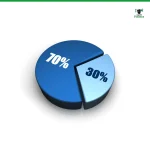Investment in mutual funds has become one of the most popular investment avenues for Indians. With the potential for good returns and the convenience they offer, it is no wonder that investors are increasingly turning to mutual funds. However, like any other investment, mutual funds carry risks. Making ill-informed decisions can lead to significant losses. Therefore, it is imperative that an investor be aware of common mutual fund mistakes. Let's learn the top mutual fund mistakes you should avoid
- 1. Ignoring Holistic Financial Planning
Mistake: Many investors enter the world of mutual funds without determining their risk appetite, overall financial status, adequate emergency funds etc. People start investing in random funds without knowing whether that fund is right for them. According to a SEBI report, 90% of investors in India withdraw their mutual fund investment within 3 years of investing. Investors are unable to stick to their plan because their portfolio does not match their psychological needs. During market volatility, people tend to withdraw their investments.
Solution: Having a comprehensive financial understanding is critical. Knowing your assets, liabilities, short-term and long-term needs, retirement planning, etc. helps you choose the right funds. Getting qualified advice should be a priority for managing your overall finances.
- Investing based on past performance
Mistake: Investors often get bogged down in numerical data and base their decisions on it alone. A common mistake they make is choosing funds based solely on historical performance. Some investors assume the past performance period with the actual investment horizon of that fund. E.g. If a fund has performed well in the last three years, it is assumed to be a good investment choice for three years. A fund's historical performance is not indicative of its future performance.
Solution: Instead of focusing only on past returns, it is crucial to evaluate the fund's fundamental ratios. Evaluate the risk profile of the fund, its ability to mitigate losses during market downturns, consistency of performance, experience of the fund manager etc.
- Over-diversify your portfolio
False: While diversification is essential to reduce risk, over-diversification can lead to redundant portfolios with similar holdings across different schemes. In India, within equity mutual funds, 60% of the industry's assets under management (AUM) are invested in Nifty 50 stocks, so you may find the same set of stocks in many funds. Much of the large cap segment of the fund's portfolio looks similar. Over-diversification not only increases your investment costs, but also makes it challenging to monitor overcrowded schemes.
Solution: Strive for a balanced portfolio. Instead of spreading your investments across too many funds, choose ones that are efficient and align well with your financial goals.
- Ignoring expense ratios: Opting for expensive oversight
False: The expense ratio reflects the percentage of a fund's assets used for administrative and operating expenses. A high expense ratio can erode your investment returns. In mutual funds, each scheme category offers two options: Direct & Regular. Direct options generally have a lower expense ratio because they avoid distribution costs. Conversely, regular options have a higher expense ratio due to agent commissions.
Solution: Better compare expense ratios within similar fund categories. Choose the direct option to avoid heavy distributor commissions. Index funds also offer lower fees than actively managed funds.
- Ignoring Index Funds: A Potential Missed Opportunity
FALSE: Compared to passively managed index funds, many categories of active funds underperform. According to the S&P Dow Jones report – SPIVA India Year 2022 Scorecard – 88% of active largecap funds are below the benchmark. Active funds include higher fees of 1% to 2% per year, while passive index funds that track their target indexes charge lower fees of 0.05% to 0.10% per year.
Solution: Assess whether your fund consistently outperforms its benchmark. If not, consider switching to index-based funds. These funds also offer the potential for better returns with lower fees (expense ratios).
- Pursuing NFOs
Misconception: Many investors favor investing in NFOs under the misconception that they are a more profitable alternative to existing funds. New fund offerings are generally launched with an NAV of Rs.100. 10, IPOs (Initial Public Offerings) of equity stocks lead to confusion. This causes investors to frequently invest their money into all newly launched funds in the market. Some of the disadvantages associated with NFOs include the lack of portfolio disclosure, which means that investors have no knowledge of the companies in which the fund invests. lack of past track record to evaluate fund's performance; High initial expense ratio in most NFOs. Over time, NFO collections have been steadily declining and a 70% decline was observed from April to September 2022.
Solution: Choose NFOs that match your profile and present something unique or innovative in terms of investment style. In cases where a new fund offers the same investment strategy as existing funds, it is advisable to do a thorough comparison before investing in the new fund. Before making any investment decisions, it is highly recommended to seek guidance from a qualified financial advisor for suitable assistance.
- Making jump exit decisions
False: Markets are volatile. Some investors panic during a downturn and withdraw their investments and suffer losses. This clearly shows that you are not in tune with your investment psychology while creating a portfolio or you have not clearly understood the risk and return aspect of that product.
Solution: Mutual fund investments should be viewed for the long term. Choose funds that have strong fundamentals and stick to your investment strategy, and avoid making rash decisions based on short-term market fluctuations.
- Ignoring tax implications
False: In India, mutual funds are taxable. Ignoring this aspect will affect your net returns. Most of the time investors don't realize that tax is different for equity schemes, debt schemes, hybrid schemes, international schemes etc. Mutual funds have short term and long term tax.
Solution: Be aware of the tax implications of your mutual funds. For example, equity funds held for more than a year have different tax treatments than those sold within a year. Always consult a financial advisor or tax professional before making any buying or selling decisions.
- Bypassing SIPs
Mistake: Many people who are new to investing prefer lump sum investments. This will expose them to risks.
Solution: Systematic Investment Plans (SIPs) allow investors to invest a fixed amount on a regular basis irrespective of market conditions. It not only averages out purchase costs over time (thanks to rupee cost averaging) but also instills a discipline in investing.
- Portfolio is not reviewed periodically
FALSE: Not re-examining your mutual fund portfolio can lead to holding bad funds.
Solution: Review your portfolio regularly at least once a year. This will help you evaluate the performance of your funds against their benchmarks and make necessary adjustments.
- Falling into market hype
False: Media and market hype can often mislead investors, causing them to make hasty decisions. Mutual fund schemes are often featured in news and articles when they give extraordinary returns and the fund may not be able to sustain its high returns in the future.
Solution: Instead of following market noise, focus on research and reliable financial advice.
- Not seeking expert advice
Misconception: Some investors avoid financial advisors because they believe mutual funds are simple, leading to uninformed decisions.
Solution: Seek advice from financial experts, especially if you are new to mutual funds. They can provide guidance tailored to your needs, risk and financial goals.
- Understand types of mutual funds and their relevance
Another crucial aspect that many investors overlook is the type of mutual funds they invest in. Mutual funds are somewhat complex structures and are classified into around 35 types as per SEBI guidelines based on the asset class they invest in and the investment strategy they employ. Let's learn about mutual fund types and how to avoid common pitfalls associated with them
- Investing without understanding the fund type
Mistake: Jumping into an investment without understanding whether it is an equity fund, debt fund, hybrid fund or any other type can lead to mismatches.
Solution: Familiarize yourself with different fund types
Equity Funds: Invest primarily in stocks. They come with high return potential but also high volatility. There are about 13 sub-categories under this category. E.g. Largecap, Midcap, Large and Midcap, Smallcap, Multicap, Flexicap, Sector Funds etc.
Debt Funds: Invest in fixed income instruments like bonds. Compared to equity funds, they are less volatile but may offer lower returns. There are 15 categories separated on the basis of investment horizon and basis risk. E.g. Liquid Funds, Money Market Funds, Ultra Short Term, Short Term, Long Term, Dynamic Bond Fund etc.
Hybrid Funds: As the name suggests, these funds invest in a mix of equity and debt, trying to balance risk and return. Hybrid funds have 6 categories viz. Arbitrage Funds, Hybrid - Conservative, Hybrid Aggressive, Multi Asset Allocation Funds, Balanced Advance Funds, Equity Savings Funds. Each category has a different investment style.
Solution Oriented: AMCs can offer two types of solution oriented funds: retirement funds and children's funds. As their names suggest, they are intended to perform specific functions and thus provide solutions to specific requirements.
- Ignorance of exit loads
Wrong: Many funds charge a fee if you withdraw your investment before a certain period, known as an exit load. Uninformed investors can incur these unnecessary costs.
Solution: Always check the exit load policy of the fund. If you foresee that you will need to liquidate your investments soon, choose funds with no or low exit loads.
- Give in to peer pressure
Mistake: Just because a family member or friend invests in a particular fund doesn't mean it's right for you.
Solution: Personal finance is 'personal'. Each has unique financial requirements, risk tolerance and investment horizons. Your investment decisions should always be based on your circumstances, not anyone else's.
The world of mutual funds is vast and offers investors many opportunities to grow their wealth. However, with opportunities come challenges. By avoiding the mistakes described above and constantly educating yourself, investors can position themselves for success. After all, the key to effective investing is not only to seize opportunities, but also to minimize potential risks. With patience, diligence and the right knowledge, mutual funds can become a valuable component of your financial portfolio.






